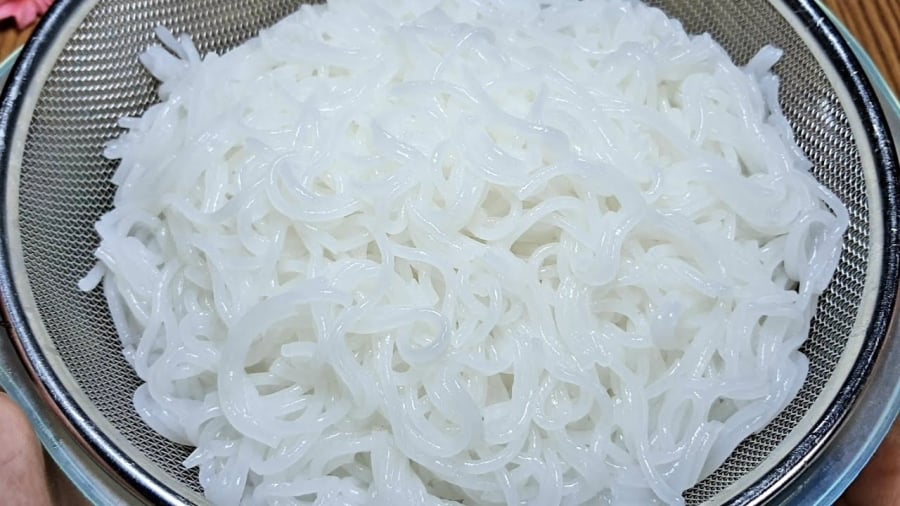Rice vermicelli, or ‘bun’ in Vietnamese, is a versatile and delicious dish that can be easily prepared and combined with various ingredients such as pork, chicken, seafood, and more. However, not everyone may be suitable to consume this popular noodle dish.

Individuals with stomach ailments
Those suffering from stomach ulcers, acid reflux, or gastritis should refrain from consuming vermicelli when their condition is active, especially on an empty stomach. Vermicelli has a slightly acidic nature, which is not stomach-friendly. When paired with broths containing vinegar, lemon, chili, or tamarind, the stomach can become irritated, leading to discomfort, heartburn, bloating, and belching.
Additionally, individuals with stomach and digestive issues should avoid even small amounts of stale vermicelli with a pronounced sour smell, as it can aggravate their condition.
People with gout
While vermicelli itself is not considered a trigger food for gout, the accompanying ingredients can be. Gout patients should steer clear of vermicelli dishes prepared with bones, red meat, seafood, or offal. These ingredients are high in purines, which convert to uric acid in the body, triggering gout attacks and causing intense joint pain and inflammation. Consuming these dishes can exacerbate the condition and increase pain levels.
Individuals with kidney issues or renal disease
For those with weak kidneys or chronic kidney disease, it is advisable to limit salt, potassium, and phosphorus intake. Unfortunately, vermicelli soups typically involve broths made from bones and meat, seasoned with generous amounts of salt, which can be detrimental to kidney health. It is best to avoid these dishes or opt for plain vermicelli or light, fresh spring rolls made with vermicelli instead.
Moreover, consuming vermicelli with fried pork rolls, pork pies, or salty dips can elevate blood pressure levels, leading to further kidney complications or edema.
Diabetics
Vermicelli is a refined carbohydrate, and people with diabetes should avoid it. Eating vermicelli can cause a rapid increase in blood sugar levels, making it challenging for diabetics to manage their condition. High blood sugar can lead to fatigue, dehydration, dizziness, and an increased risk of eye, cardiovascular, and kidney complications.
Additionally, vermicelli dishes with fatty broths, sweet dips, or meat products can increase calorie and unhealthy fat intake, posing further risks to diabetics.

People with liver disease
The liver is responsible for detoxifying the body, but consuming vermicelli from unsafe sources may introduce harmful substances like bleaching agents, borax, or mold inhibitors. These chemicals can damage liver cells and worsen liver conditions. Additionally, vermicelli dishes tend to be oily and spicy, which are not liver-friendly.
Individuals with a weak immune system, flu, or fatigue
Vermicelli sold in markets is often not adequately covered, increasing the risk of bacterial contamination. Those with a weakened immune system, flu, or recovering from illness should avoid eating vermicelli from street vendors. Moreover, sour vermicelli can cause digestive issues, and consuming cold or reheated vermicelli can aggravate flu symptoms and prolong recovery.
The Secret to Reducing Bitter Melon’s Bitterness by 70%: A Trick Up Your Sleeve.
Bitter melon, or bitter gourd, is renowned for its cooling and health-boosting properties. However, its intense bitterness can be off-putting to many, making it a challenging vegetable to consume. The key to enjoying this nutritious treat lies in minimizing its bitter taste, thus making it more palatable for those who wish to reap its benefits without enduring an overpowering bitterness.
The Ultimate Superfruit: Nature’s Candy with Astonishing Health Benefits
Introducing the revolutionary superfruit that is taking the health world by storm! With an incredible sweetness that surpasses cane sugar by 300 times, this fruit is a game-changer for those conscious of their health. But the benefits don’t stop there – it also boasts the ability to support cancer prevention, all without spiking blood sugar levels. This natural wonder is truly a gift from nature, and it’s easy to see why it’s becoming a favorite among health enthusiasts.


































